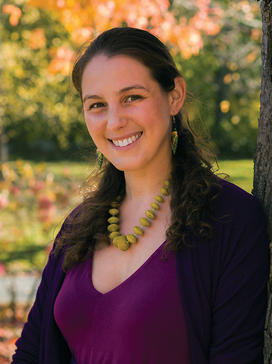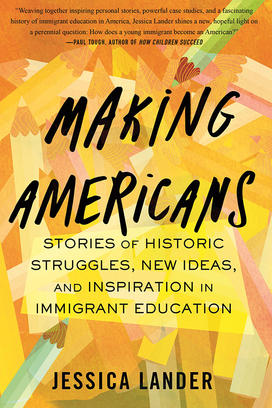Jessica Lander ’10 Writes About the Educators of Immigrant Students
High school teacher Jessica Lander ’10 explores how educators are making a difference in the lives of immigrant students

Jessica Lander was sitting in her classroom at Lowell High School in Massachusetts one day when a gangly student named Wilson asked to eat lunch with her. The teenager, who had recently moved from Puerto Rico, didn’t feel he had anywhere at the school where he really belonged. Soon, Wilson ate with her every day — then something remarkable happened. As Lander relates in the introduction to her new book, Making Americans: Stories of Historic Struggles, New Ideas, and Inspiration in Immigrant Education (Beacon Press), other students started joining the makeshift lunch club — hailing from such countries as Vietnam, Yemen, Iraq, and Liberia — until her classroom was a veritable United Nations cafeteria.
One day, she taught Wilson how to eat with chopsticks, and weeks later he brought in dozens of pairs for his classmates, and the room filled with the exuberant sounds of students excitedly teaching each other how to eat with them — a cross-cultural moment when suddenly joy and community had emerged from a multiplicity of disparate backgrounds. “It was such a beautiful moment,” says Lander, describing the genesis behind her ambitious book, published this past fall. “I teach refugee students from 30 countries, and they inspire me every day. I really wanted to understand how we can reimagine education and create schools to better support these immigrant-origin students.”

Nationwide, one out of every four students is of recent immigrant origin — meaning either they or their parents are from another country. And yet, too often, these students are asked to assimilate into a one-size-fits-all educational system that ends up obscuring or suppressing their potential. Lander crisscrossed the country to find examples of innovative programs and schools bringing out the best in these students. Among them is the Global Village Project, a school in Georgia that teaches refugee girls, some with limited formal schooling — but with a wealth of real-world knowledge and grit. “They are respecting and acknowledging those strengths, while also giving them the support they need academically to be able to thrive in schools in the U.S. and beyond,” Lander says.
“I teach refugee students from 30 countries, and they inspire me every day. I really wanted to understand how we can reimagine education and create schools to better support these immigrant-origin students.”
— Jessica Lander ’10
In North Carolina, a determined director of English learners helped implement a new approach to teaching literacy in 126 schools where students take apart complex sentences, rather than the simplified ones that English learners are often given. In Lawrence, Massachusetts, a program within the high school called ENLACE (Engaging Newcomers in Language and Content Education, pronounced en-LAH-say) reaches beyond school walls to actively cultivate relationships with parents and community members to support recent immigrant students, who are predominantly Hispanic. Connecting all of these programs, Lander found they all had the same ability to make students feel included. “At a deeper level, it comes down to how schools are helping ensure our students feel like they belong here, in all of their beautiful identities.”
At the same time, Lander weaves in surprising stories of past moments in American history when courageous individuals struggled to expand opportunities for previous generations of immigrants from countries such as Ireland and Germany. One standout is the tale of Robert Meyer, a small-town Nebraska schoolteacher who challenged bans on teaching foreign languages in school in the early 20th century — taking the fight all the way to the Supreme Court and establishing the right for students to be taught other languages in the United States. “There’s a lot to learn from these powerful and beautiful stories about people who are a part of making change happen,” she says.
Lander grew up in the Boston area, descended in part from Jewish refugees from Russia and Ukraine who came to America at the turn of the 20th century. Her fascination with education began in her freshman year of college with a Princeton-sponsored trip to Tanzania, where she encountered a school of thriving low-income students and wanted to better understand why it was successful and how it could be replicated. She majored in anthropology, writing her thesis on the school — and then just days after graduating, flew to Thailand to teach for a year at Chiang Mai University as part of the Princeton in Asia program.
She became passionate about connecting with students. “I remember sitting outside after my last class and being so sad I wouldn’t get to see my kids every day,” she says, “and realizing I couldn’t leave the classroom.” Lander shifted gears, becoming a full-time teacher, eventually ending up in Lowell, where she developed innovative methods to teach history and civics to her recent immigrant and refugee students. Each year, she leads the class in the creation of a cookbook of family recipes and stories of migration, and teaches students to write op-eds about issues they care about, collaborating with The Lowell Sun to publish them.
“My hope is that by grounding the book in the intimate stories of people, readers will have empathy for these people and their stories, no matter where they are coming from, or how long their family has been in the country.”
— Lander
As she watched her own students thrive, Lander eventually became more curious about how other schools were teaching immigrant students. “Too often in education, teachers are very isolated,” she says. “We have too little time to learn from our peers.” She conceived of Making Americans as a way to both pursue her own curiosity about what her colleagues were developing, and share it with others.
“My hope is that by grounding the book in the intimate stories of people, readers will have empathy for these people and their stories, no matter where they are coming from, or how long their family has been in the country,” Lander says. “If we can empathize with others, we can build connection and understanding.”











No responses yet